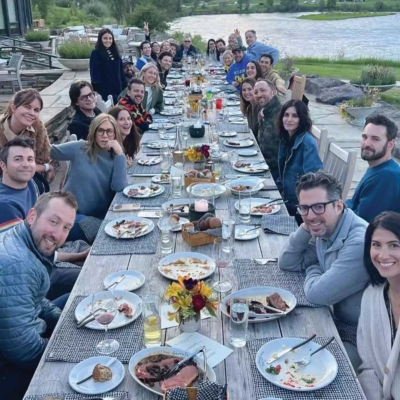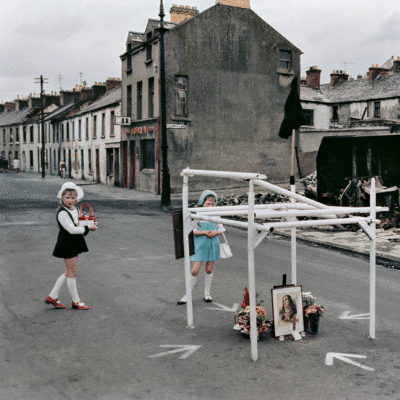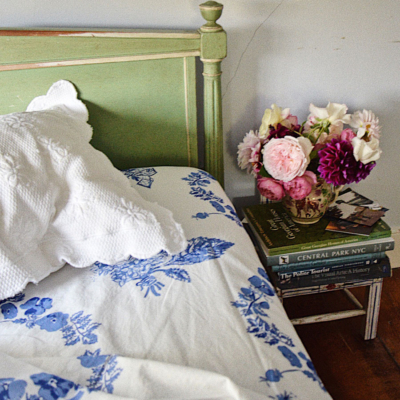Gerald Tomkin explains how an unlikely discovery leads to a visit from the Gardaí …
I grew up in a very special house by the sea, the first of the neo-gothic small houses to be built in Ireland with wonderful painted ceilings by John Hungerford Pollen. It was small because the owner who commissioned the house was a bachelor. He was famous for being the attorney general and having a murder attempt on his life on the steps of the Kildare Street Club in Dublin. The house was slightly enlarged when the owner got married and now is still a small house, about 6,000sq ft.
I tell you all this so that you can understand that the house had many small rooms, cupboards and other storage places, including a large barn and cowshed for ten cows. Storage was not a problem, and little was ever thrown away. My father died at the age of 91, my mother a few years later. My brother and I were medical practitioners and my other brother a lawyer so we were all trained to be untidy and to not throw anything away. Time passed and developers offered us money way and beyond the value of the wonderful house, so we moved to Kilmacanogue. The name is difficult to pronounce and even more difficult to write for some so “Kilmac” is often used.
Moving house is a very complicated affair. It needs someone ruthless to decide that everything should be thrown away. I rescued a Victorian woven tapestry screen from the top of a bonfire my son was creating before we left our home. I came to the conclusion that if I built a large shed at the new house then I could put all my stuff in the shed and could defer the decision-making over what to keep and what to throw out. The shed was large enough for my 1953 Massey Ferguson tractor, in need of much loving care, but still useful perhaps, even though we don’t have a field. Just in case, the tractor came with us. That necessitated the purchase of a four-wheel twelve-foot trailer as the tractor really was not roadworthy.
Then there was the 36-inch Ransomes cylinder mower which was too heavy for me to use when I was in my prime, but I always wanted one and so I used it, but with difficulty, for many years before our move. Going forward in a straight line was no problem but going backwards was more difficult and the machine tended to knock me over if I was not very careful. Turning was even more difficult. I now find it is a little large for the grass tennis court I am making but I persist. I can usually manage to get it out of the shed and walk it on to the tennis court now, but have to get the tractor to pull it back to the shed. Then there was the 24- inch cylinder mower with eight blades, suitable for a golf green. That certainly had to come for when the tennis court was ready! And of course, a very old 42-inch walk-behind rotary mower that I had spent a year fixing (with help), a rather new small rotary mower, chainsaws and much more. But the shed still had lots of room for stuff.
The move went without a hitch. The screen carefully installed (the chandelier also came but that is another story), furniture we were never going to use and even a pre-war brass blowlamp. I was happy. Alas, two years later my son, who like his mother is particularly tidy, got the urge to start tidying up the shed and one evening I saw the trailer with the four wheels, again full of stuff, and almost on the top my beautiful screen which my late mother bought at an auction, probably in 1945. The next day, I tried to save it but it had rained heavily during the night and so I gave up. Instead I agreed to take it to the nearby dump.
Murders were hard work and there had been a lot of them recently.
The dump is in a beautiful location, at the head of a valley with lots of trees, a long avenue and when you get there, a weigh bridge. I had to go into a cabin office where a sort of friendly man took my details, asked what was in the trailer, took my details again, and credit card and told me to proceed. By the end of all this, and a queue of large lorries behind me, we had become friends! I then proceeded to an area with a red light and when a bay was free I proceeded. Now I am not good at reversing a long trailer. I had memories of my horsebox many years before but a really helpful man helped me. I started to unload and could see it might take me a week, so very kindly he did virtually everything. Maybe I lifted one standard lamp and an electric fire which may still have been working when my son threw it on the trailer. No way could I have managed the sofa and chairs etc. He was a real gentleman. I then left and went back to the weigh bridge and again into the hut where my new friend used my credit card. He returned it to me only a little lighter and off I went. When I got home, I reversed the trailer carefully into its bay, unhitched the trailer, remembering to use the brake and, delighted with myself, went into my study to catch up on an article I was writing on diabetes dyslipidemia and atherosclerosis.
I was getting on well with my work, gazing out the window for inspiration, when my daughter-in-law, a wonderfully talented professional harpist, came to say there were two gentlemen to see me. These two well-dressed gentlemen refused my invitation to sit down and announced, with cards to confirm, that they were detectives and wanted to ask me some questions. I got nervous at this stage and wondered what they had found out about me. In the heat of the moment I could not think of any worse misdemeanour that I had committed – later I could think of lots.
They asked me if I had been at the dump that morning and I said yes. Then they asked me what I dumped. I told them a sofa, a chair, some electrical equipment. “What else?” they both asked in unison. I thought hard and then mentioned the screen and then I remembered that by mistake I had left behind the rope that had tied the goods on the trailer and wondered if I could get it back. Something seemed to irritate them and they said, “Well, we will tell you. You left human bones in the dump which has been closed and is now a murder scene.”
I suddenly put two and two together and said “Oh! My father’s bones.” There was silence. I knew that I had said something that worried them so after a long silence I explained that my father, my late brother and I were all medical practitioners and as students we all learned anatomy on these bones. I was all set to tell them much more about my father and his bones but thought better of it.
When I said all this they seemed relieved and started to leave. I bravely asked if I could have my father’s bones back, but this caused an explosion. “Don’t say ‘my father’s bones’”, they exclaimed! The story made a small article in the Irish Times but fortunately I was not mentioned.
Some weeks later, I got a call from our local garda station to say they had a parcel for me. I agreed a time and date. When the time came, I suddenly wondered what I was to say when I went in to the office. I thought I would be unwise to ask for my father’s bones again. Goodness knows what they might do to me on their own territory. I blurted out my name to the pleasant ban garda and that I was looking for my father’s bones. This caused her great amusement and off she went to find a large brown paper bag. She explained her colleagues were very happy when they discovered that there was no suspected murder to investigate.
My father’s bones are carefully hidden in my wardrobe in case one of my twelve grandchildren should decide to study medicine. I hope one of them gets there before my son decides they need to be disposed of.
LOVETHEGLOSS.IE?
Sign up to our MAILING LIST now for a roundup of the latest fashion, beauty, interiors and entertaining news from THE GLOSS MAGAZINE’s daily dispatches.









